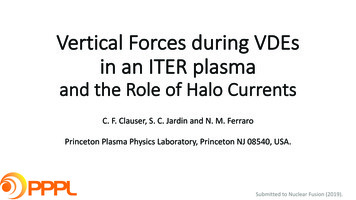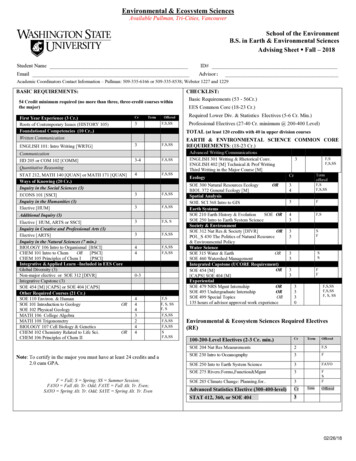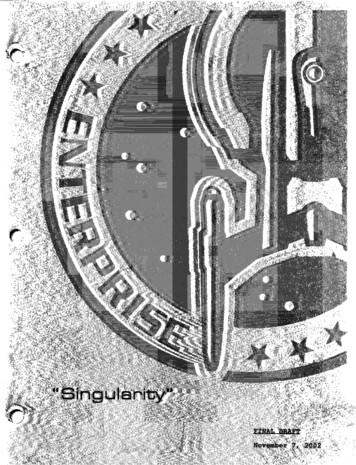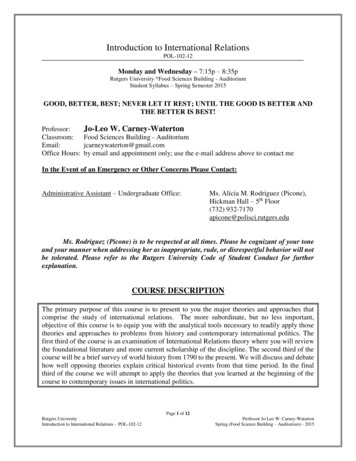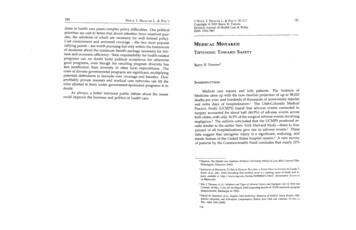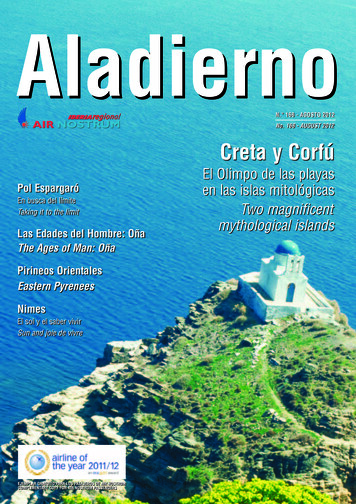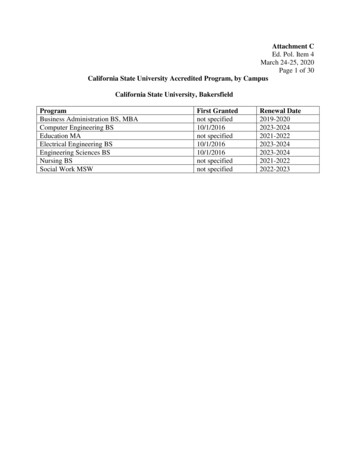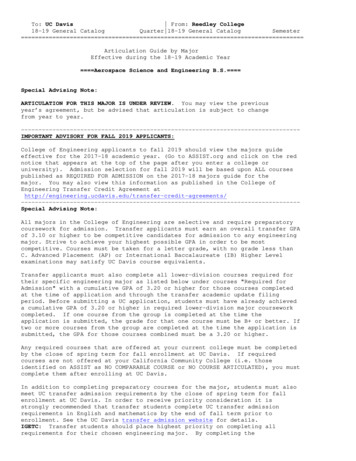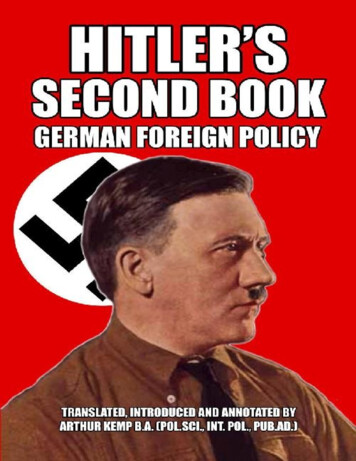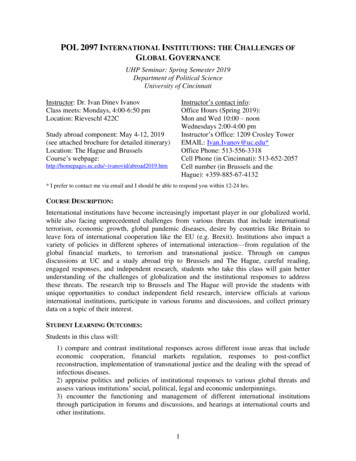
Transcription
POL 2097 INTERNATIONAL INSTITUTIONS: THE CHALLENGES OFGLOBAL GOVERNANCEUHP Seminar: Spring Semester 2019Department of Political ScienceUniversity of CincinnatiInstructor’s contact info:Office Hours (Spring 2019):Mon and Wed 10:00 – noonWednesdays 2:00-4:00 pmInstructor’s Office: 1209 Crosley TowerEMAIL: Ivan.Ivanov@uc.edu*Office Phone: 513-556-3318Cell Phone (in Cincinnati): 513-652-2057Cell number (in Brussels and theHague): 359-885-67-4132Instructor: Dr. Ivan Dinev IvanovClass meets: Mondays, 4:00-6:50 pmLocation: Rieveschl 422CStudy abroad component: May 4-12, 2019(see attached brochure for detailed itinerary)Location: The Hague and BrusselsCourse’s webpage:http://homepages.uc.edu/ ivanovid/abroad2019.htm* I prefer to contact me via email and I should be able to respond you within 12-24 hrs.COURSE DESCRIPTION:International institutions have become increasingly important player in our globalized world,while also facing unprecedented challenges from various threats that include internationalterrorism, economic growth, global pandemic diseases, desire by countries like Britain toleave fora of international cooperation like the EU (e.g. Brexit). Institutions also impact avariety of policies in different spheres of international interaction—from regulation of theglobal financial markets, to terrorism and transnational justice. Through on campusdiscussions at UC and a study abroad trip to Brussels and The Hague, careful reading,engaged responses, and independent research, students who take this class will gain betterunderstanding of the challenges of globalization and the institutional responses to addressthese threats. The research trip to Brussels and The Hague will provide the students withunique opportunities to conduct independent field research, interview officials at variousinternational institutions, participate in various forums and discussions, and collect primarydata on a topic of their interest.STUDENT LEARNING OUTCOMES:Students in this class will:1) compare and contrast institutional responses across different issue areas that includeeconomic cooperation, financial markets regulation, responses to post-conflictreconstruction, implementation of transnational justice and the dealing with the spread ofinfectious diseases.2) appraise politics and policies of institutional responses to various global threats andassess various institutions’ social, political, legal and economic underpinnings.3) encounter the functioning and management of different international institutionsthrough participation in forums and discussions, and hearings at international courts andother institutions.1
4) research, write and present findings on a question related to international institutions.PEDAGOGY AND EXPERIENTIAL LEARNING COMPONENTS:Class meetings will combine in class lectures and seminar-style discussions with timereserved for small group meetings of students doing related research topics, and criticalinteractions about assigned materials in light of current events around the world.Additionally, students will design and implement policy responses by contributing to onlinediscussion boards on Blackboard. To that end, students will need to submit five 250-300-wordpolicy responses which should be posted in the appropriate blackboard discussion boardforum (look for author’s names) by midnight on the day before the class meeting.The study abroad portion will take place in The Hague and in Brussels May 4-12, 2019 (seethe tentative schedule for details). Students should submit their applications no later thanSeptember 14, 2018. Students from the Taft Departments are eligible to apply for TaftUndergraduate Enrichment Award (the due date he due date for Taft applications is set forNovember 2, 2018). Please contact the instructor at ivanovid@ucmail.uc.edu if you needadditional information.As a part of the study abroad program all students need to complete a creative group outreachproject. A group of 5-7 students will work together on a 10 min creative presentation (e.g.using PowerPoint, Video or other format) that highlights three main aspects of theirexperience: (1) a presentation of a specific institutional policy or aspect of the trip; (2) a briefdiscussion how this program has enriched their scholarly knowledge on the topic and; (3) whyand how the program is valuable to the UC community.Students will be required to complete a final project that includes a final paper (10-12 pagesdouble-spaced). Please check with the instructor for the and content of the research-basedproject to make sure it would be appropriate to student’s major and agreed upon withprofessor. Finally, course participants will need to complete in-class or on-sitepresentation/discussion of final project.COURSE REQUIREMENTS AND GRADING:Course Requirements% of final gradePolicy responses (via Blackboard)25% (5x5%)Presentation of the final paper10%Group outreach project15%Participation in study abroad events and discussion 15%Final paper35%2Due Dateweekly/ before classJan 14-Apr 22, 2019May 31, 2019May 4-11, 2019TBD (tentative)
Course Grading Scale:93-100%A90-92%A87-89%B 83-86%B80-82%B77-79%C 73-76%70-72%67-69%63-66%60-62%0-59%CCD DDFPOLICIES AND CAVEATS:First, if you have any medical condition or disability that affects your performance in class orlimits your participation in the study abroad in The Hague and Brussels, please notify theinstructor at the beginning of the semester in order to find an accommodation that meetsbest student’s interests. Also, for advice and assistance you may contact the university’sdisability services office, located in 210 University Pavilion, Phone 513-556-6823, Email:disabisv@ucmail.uc.edu. Similarly, please notify immediately the instructor if you haveconcerns regarding your participation in trip to The Hague and Brussels (especially if you arefacing issues/ concerns that might prevent you from participating in the program). Failure todo so on time may incur significant costs for you.Second, the anticipated tentative cost of the trip includes airfare, lodging, local transportation(bus, metro, tram, etc) in The Hague and Brussels, a visit to SHAPE in Mons, city tours andsome meals. Additionally, visit program’s 2019 webpage for further information that includespresentational information, course policies, program schedule, and stuff to do in Brussels andthe Hague is available here: http://homepages.uc.edu/ ivanovid/abroad2019.htmThird, please note that most readings are available on the course’s webpage on Blackboard.When electronic versions of readings are not available, paper or electronic copies will bedistributed. Finally, I also need to remind you that all of the work you submit in this courseshould be your own. Students should review the UC student code of conduct and be aware ofall activities defined as academic dishonesty. I do encourage students to exchange ideasand/or work together. However, unless it is a group project, each student is responsible forcompleting and submitting his or her own assignments. Please be advised that according tothe UC Student Code of Conduct plagiarism is defined as:(1) Submitting another’s published or unpublished work in whole, in part or in paraphrase,as one’s own without fully and properly crediting the author with footnotes, quotationmarks, citations, or bibliographic references.(ii) Submitting as one’s own original work, material obtained from an individual, agency,or the internet without reference to the person, agency or webpage as the source of thematerial.(iii) Submitting as one’s own original work material that has been produced throughunacknowledged collaboration with others without release in writing from collaborators.(iv) Submitting one’s own previously written or oral work without modification and3
instructor permission.*Fourth, in order to defray the cost of the study abroad program, students are encouraged toseek different sources of funding. College and UC International advisors can provideadditional information for sources of financial support during 2018-19 academic year.REQUIRED TEXTBOOK AND OTHER SOURCES:Ian Hurd, International Organizations: Politics, Law, Practice, 3rd Edition (CambridgeUniversity Press, 2018). You can purchase a hardcopy at UC Bookstore &other retailers.ISBN 978-1-316-63445-5; you can also buy e-book. Electronic version is available here:https://doi.org/10.1017/CBO9780511779824. E-book’s ISBN is 9780511779824. A copyis available on a 2-hour reserve at Langsam Library’s front desk.COURSE READINGS:Week 1 (Jan 14). Why do states form institutions? What is regional and globalgovernance and what are the benefits of it?Required readings:Hurd, Chapters 1 and 2, pp. 1-79.Lisa Martin and Beth Simmons, “Theories and Empirical Studies of InternationalInstitutions,” International Organization, Vol. 52, no. 4 (Autumn 1998), pp. 729-757.Jon C Pevehouse, “Democracy from the Outside-In? International Organizations andDemocratization,” International Organization, Vol. 56, no. 3 (Summer 2002), pp. 515-549.Michael Zuern, A theory of Global Governance: Authority, Legitimacy, and Contestation(Oxford University Press, 2018). Chapter 1, pp. 1-22.Recommended: David Lake, “Beyond Anarchy: The Importance of Security Institutions,”International Security, Vol. 26, no. 1 (Summer 2001), pp. 129-160.Kal Raustiala and Anne-Marie Slaughter, “International Law, International Relations andCompliance,” in The Handbook of International Relations, Edited by Walter Carlnaes,Thomas Risse and Beth Simmons, Sage Publications, (2002), pp. 538-58.Week 2 (Jan 21). Martin Luther King Day (no classes).Week 3 (Jan 28). Understanding the United Nations’ System and its Role in GlobalGovernance: The Case of the International Court of Justice (ICJ)Required readings:Hurd, Chapter 3 and 4, pp. 42-108.Hurd Chapter 8, pp. 192-225.Eric Posner and Miguel de Figueiredo, “Is the International Court of Justice Biased?” TheJournal of Legal Studies, Vol. 34, no. 2 (June 2005), pp. 599-630.*The University of Cincinnati Student Code of Conduct, approved by UC Board of Trustees, April 15, 2015;available at https://www.uc.edu/conduct/Code of Conduct.html.4
Recommended: Bosco, Five to Rule Them All: the UN Security Council and the Making of theModern World (New York: Oxford University Press, 2009), Chapters 5-7 and Conclusion, pp.148-256.Ruth Mackenzie, Cesare Romano, Philippe Sands, and Yuval Shany, The Manual onInternational Courts and Tribunals (Oxford University Press, 2nd Edition, 2010); Chapter 1,The International Court of Justice (ICJ), pp. 4-39.Week 4 (Feb 4). Transnational Justice and Global Governance: Ad-Hoc Tribunals andthe International Criminal Court (ICC)Required readings:Hurd, Chapter 9 pp. 226-254.Kathryn Sikkink, “Transnational Politics, International Relations Theory, and Human Rights,”PS: Political Science and Politics, Vol. 31, no. 3 (September 1998), pp. 516-523.Christopher Rudolph (eds), Power and Principle: the Politics of International CriminalCourts (Ithaca, NY: Cornell University Press, 2017). Selected Chapters (Introduction hasbeen posted on Blackboard).Sang-Hyun Song, “Preventive Potential of the International Criminal Court,” Asian Journal ofInternational Law, Vol. 3 (May 2013), pp. 203–213.Recommended: Terrence Chapman and Stephen Chaudoin, “Ratification Patterns and theInternational Criminal Court,” International Studies Quarterly, Vol. 57, no. 2 (November2013), pp. 400–409.Kristian Zic, “The International Criminal Tribunal for the Former Yugoslavia: ApplyingInternational Law to War Criminals,” Boston University International Law Journal, Vol. 16(1998), pp.507-533.James Gow, Rachel Kerr and Zoran Pajic (eds.), Prosecuting War Crimes: Lessons andLegacies for the international Criminal Tribunal for the former Yugoslavia (London and NewYork: Rourledge, 2014). Selected chapters (see instructor for a copy of the book).Serge Brammertz and Michelle Jarvis, Prosecuting Conflict-Related Sexual Violence at theICTY (Oxford University Press, 2016). Selected chapters (see instructor for a copy of thebook).Ruth Mackenzie, Cesare Romano, Philippe Sands, and Yuval Shany, The Manual onInternational Courts and Tribunals (Oxford University Press, 2nd Edition, 2010); Chapter 7,The International Criminal Court (ICC) and Chapter 8, The ad hoc International CriminalTribunals (ICTY, ICTR), pp. 184-252.Week 5 (Feb 11). Global Governance in Economic Affairs: International FinancialInstitutions’ ApproachRequired readings:Hurd, Chapter 6, pp. 138-167.Michael Barnett and Martha Finnemore, Rules for the World: International Organizations inGlobal Politics (Ithaca: Cornell University Press, 2004), Chapter 3, pp. 45-72.5
Recommended: Ngaire Woods, The Globalizers: The IMF, the World Bank, and TheirBorrowers (Ithaca: Cornell University Press, 2006), Introduction and Chapter 7, pp 1-38; 179214.Week 6 (Feb 18). Global Governance and Institutional Responses to TerrorismRequired Readings:Martha Crenshaw, “The Strategic Logic of Terrorism;” in Betts (ed.) Conflict after the ColdWar (Pearson, 2013), pp. 481-94.Risa A. Brooks, “Muslim “Homegrown” Terrorism in the United States How Serious Is theThreat?,” International Security, Vol. 36, no. 2 (Fall 2011), pp. 7-47.Recommended: Giuseppe Nesi, International Cooperation in Counterterrorism: The UnitedNations and Regional Organizations in the Fight against Terrorism (Ashgate, 2013), SelectedChapters.Week 7 (Feb 25). The European Union as a Sui Generis Regional GovernanceInstitution: The Role of the European ParliamentRequired Readings:Hurd, Chapter 10, pp. 255-258.Simon Hix and Bjorn Hoyland, The Political System of the European Union (PalgraveMacmillan, 2011); Chapter 3 (“Legislative Politics”), pp. 49-101.Recommended: Roger Scully, Simon Hix and David M. Farrell, “National or EuropeanParliamentarians? Evidence from a New Survey of the Members of the European Parliament,”Journal of Common Market Studies, Vol. 50, no. 4 (2012), pp. 670–683.Thomas Christiansen and Christine Neuhold,” Informal Politics in the EU,” Journal ofCommon Market Studies, Vol. 52, no. 2 (2014), pp. 354–370.Week 8 (March 4). The European Union as a Sui Generis Regional GovernanceInstitution: The Role of the European Council and the European CommissionRequired Readings:Simon Hix and Bjorn Hoyland, The Political System of the European Union (PalgraveMacmillan, 2011); Chapters 1 and 2, pp. 1-48Recommended: Robert Thomson, “National Actors in International Organizations: the Caseof the European Commission,” Comparative Political Studies, Vol. 41, no. 2 (February2008), pp. 169-192.Stéphanie Novak, “The Silence of Ministers: Consensus and Blame Avoidance in the Councilof the European Union,” Journal of Common Market Studies, Vol. 51, no. 6 (2013), pp. 1091–1107.Week 9 (March 11). The EU Regional Governance in International FinancesRequired Readings:6
Simon Hix and Bjorn Hoyland, The Political System of the European Union, PalgraveMacmillan, 2011, Chapter 10 (“Economic and Monetary Union”), pp. 245-272.Erik Jones and Gregory Fuller, “Europe and the Global Economic Crisis” in R. Tiersky and E.Jones, Europe Today (Lanham, MD: Rowman and Littlefield, 2015), Fifth Edition, pp. 343368.Recommended: Jesús Crespo Cuaresma, and Maria Silgoner, “Economic Growth andInflation in Europe: A Tale of Two Thresholds,” Journal of Common Market Studies, Vol. 52,no. 4 (2014), pp. 843-860.Matthias Morys, “Gold Standard Lessons for the Eurozone,” Journal of Common MarketStudies, Vol. 52, no. 4 (2014), pp. 728-741.March 18-24 Spring Break (no classes)Week 10 (March 25). Regional Security Governance: NATO’s Partnerships and Its Outof-the-Area EngagementRequired readings:Rebecca Moore and Damon Colletta, “Introduction: Alliance, Identity and Geopolitics” inNATO’s Return to Europe: Engaging Ukraine, Russia and Beyond (eds.) Rebecca Moore andDamon Coletta, Georgetown University Press (2017), pp. 1-18.Rebecca Moore, “Partnership Goes Global: the Role of Non-Member, non-EU states in theEvolution of NATO” in NATO in Search of a Vision (eds.) Aybet and Moore, GeorgetownUniversity Press (2010), pp. 219-42.Sten Rynning, NATO in Afghanistan (Stanford, CA: Stanford University Press, 2012),Introduction, pp. 1-8; and Chapter 3 (“NATO and Afghanistan”), pp. 41-67.Recommended: Dennis Gyllensporre, “NATO Engagements in Africa: Is there a Strategy forthe Continent?” in Pursuing Strategy: NATO Operations from the Gulf War to Gaddafi (eds.)Håkan Edström and Dennis Gyllensporre, Palgrave McMillan (2012), pp. 157-186.Ryan Hendrickson, “NATO’s Operation Allied Force: Strategic Concepts and InstitutionalRelationships” in Pursuing Strategy: NATO Operations from the Gulf War to Gaddafi (eds.)Håkan Edström and Dennis Gyllensporre, Palgrave McMillan (2012), pp. 82-93.Ivan Dinev Ivanov, “European Security at Crossroad after Ukraine: Institutionalization ofPartnerships and Compliance with NATO’s Security Policies” in NATO’s Return to Europe:Engaging Ukraine, Russia and Beyond (eds.) Rebecca Moore and Damon Coletta,Georgetown University Press (2017), pp. 167-192.Week 11 (April 1). The EU and NATO’s Role in the European Liberal OrderRequired readings:Celeste Wallander, “Institutional Assets and Adaptability: NATO after the Cold War,”International Organization, Vol. 54 (2000), pp. 705-35.Stephanie Hofmann, “Overlapping Institutions in the Realm of International Security: TheCase of NATO and ESDP,” Perspectives on Politics, Vol. 7 no. 1 (2009), pp. 45-52.7
Recommended: Richard Whitman and Emma Stewart, “The Foreign Policies of Europe andits States,” in Developments in European Politics (eds) Erik Jones et. al., Palgrave McMillan(2011), Ch. 15.Alexander Spencer, “Old’ and ‘New’ European Counter-Terrorism,” in Developments inEuropean Politics (eds.) Erik Jones et. al., Palgrave McMillan (2011), Ch. 16.Week 12: (April 8). Global Governance and International Responses to Environmentaland Epidemic ThreatsRequired readings:Thomas F. Homer-Dixon, “Environmental Changes as Causes of Acute Conflict;” in Betts(ed.) Conflict after the Cold War (Pearson, 2013), pp. 614-28.Susan Peterson, “Epidemic Disease and National Security,” Security Studies 12, no. 2 (Winter2002/3), pp. 43-81.Recommended: Theodore Brown, Marcos Cueto, and Elizabeth Fee, “The World HealthOrganization and the Transition from ‘International’ to ‘Global’ Public Health,” AmericanJournal of Public Health 96, no. 1 (January 2006): MC1470434/Week 13 (April 15). Panel Discussions #1&2Topic: #1 The Role of International Courts and the Challenges of Global Governance:ICJ, ICC and Their AntecedentsOlivia Mesecar, “The Evolution of Arbitration and Adjudication in Int'l Law: the Cases ofPermanent Court of Arbitration and ICJ”Parker Cellura, “ICJ's Role in State-to-State Property Disputes”Jillian Cordial, “ICJ Jurisdiction on Consular Protection: The Case of the U.S.”Reese Whitely, “ICC and Domestic Courts' Jurisdiction over Crimes Covered in the ICCStatute”Claire Piorkowski, “ICC non-Members' Compliance with the Court's Jurisdiction”Topic: #2 The European Union, the United States and Global Governance inComparative PerspectiveJenna Heini, “US Citizens and the ICC Jurisdiction”Erin Heilman, “EU-US Agricultural Trade: Constraints and Opportunities”Kathryn Heuerman, “FBI and Europol: Differences and Similarities”Justin Wise, “Universal, Regional and National Protection of Intellectual Property Rights”Zach Siegert, “EU and US Approaches to Environmental Regulation in ComparativePerspective”8
Week 14 (April 22). Panel Discussions #3&4Topic: #3 Governance and Governability in Times of Crisis: Issues Identity,Immigration, Terrorism and PeacekeepingChristina Szigety, “Immigration and Socio-political Identity in the EU”Hannah Schwaeble, “Ethnicity and Nationality in Europe: The Role of International andEuropean Institutions”Emily Walburn, “EU Policy on Immigration: Changes and Challenges”Dhruv Vijay Maroo, “UN- NATO Cooperation in International Operations”Connor Herbert, “EU and Policies on Prevention of Terrorism”Topic: #4 The European Union’s Response to Environmental Threats, Sustainability,Energy, Economic Growth and Healthcare ThreatsCaleb Akers, “The Role Nuclear Power in EU Energy Policy”Delaney Rice, “EU and US Food and Agriculture Regulations”Alexander Suer, “EU's Reponses to the Financial Crisis and Patterns of Growth in the Unionafter the Crisis”Martin Rakoff, “EU Sustainable Energy Initiatives in Support of UN EnvironmentalResolutions”Lauren Ruehrwein, “Healthcare Resource Management of the EU members' HealthcareProviders”Online Sources about International InstitutionsHistory of the EU The European Union, a guide for ing/eu-guide-for-americans/“Key facts and figures about the EU” EU Commission download from:http://europa.eu.int/abc/keyfigures/index en.htmSchuman Declaration, s/europeday/schuman-declaration/index en.htmThe History of the European Union,http://europa.eu/about-eu/eu-history/index en.htmCraig Parsons, A Brief History of the European arsons Brief%20History%20of%20EU.2009.docKristin Archick, Derek E. Mix, The European Union: Questions and 9
EU as a Sui Generis Institution: Treaties, Institutions and Politics The Treaty of Lisbon at a glance, http://europa.eu/lisbon treaty/glance/index en.htmJ.H.H. Weiler, On the political and legal DNA of the Union and the Current in/images/Downloads/media events/weiler rede.pdfKristin Archick, European Union pdfKristin Archick, Derek E. Mix, The European Union’s Reform Process: The 8 20110208.pdfThe European Union Budget at a ublications/glance/budget glance en.pdfSources on International Tribunals and Transnational Justice The International Court of Justice (ICJ), http://www.icj-cij.org/homepage/The International Criminal Tribunal for Former Yugoslavia (ICTY),http://www.icty.org/The International Criminal Court (ICC),http://www.icc-cpi.int/en menus/icc/Pages/default.aspxFor details of the Rome Statute, visit, http://www.un.org/law/icc/Sources on Other International Organizations The International Monetary Fund (IMF), https://www.imf.org/external/about.htmThe International Bank for Reconstruction and Development (IBRD or the L/EXTABOUTUS/EXTIBRD/0,,contentMDK:21130269 menuPK:3168298 pagePK:64168445 piPK:64168309 theSitePK:3046012,00.htmlThe World Health Organization (WHO), http://www.who.int/csr/disease/ebola/en/The International Organization on Migration (IMO), http://www.who.int/about/en/The Food and Agriculture Organization (FAO), http://www.fao.org/themes/en/Suggested List of Research TopicsI encourage you to discuss with the instructor the research topic before departing to Brussels.Below is a list of topics that you should consider for your final project. Note that I can provideyou with guidance on these topics and be able to help you identify good research questionsand otherwise assist you in the project development process. While it would be good ifstudents pursued a wide array of topics, it is okay for more than one student to focus on aparticular topic so long as they work independently and write their own papers. Additionally,you should be able to relate these topics to themes we will be encountering in the commonreadings I’ve assigned for the first half of the course. Please, realize that if students pick their10
own topic, the burden for developing the project will fall mainly on them, as I may not bewell positioned to assist with readings. Students need to assess the tradeoff between havingmore autonomy in topic choice and taking more responsibility for any problems youencounter.Also, when selecting the topic, you should take into account several factors: First, your finalproject can be theory-driven or issue driven (e.g. you can choose to test one or severalcompeting theories/ explanations in the literature to see which one offers a better explanationof a certain aspect of international cooperation). Second, you need to formulate an interestingand insightful research question. Remember the question has to flow from the existingliterature and contribute to the major intellectual debates or discussions on the topic. Third, inorder to formulate an interesting question and provide an insightful response, students shouldreview and know well the existing literature on the topic. Fourth, you can choose if you wantto study one or several cases, instances or institutions of international cooperation thuscompleting a single-case or comparative study. Here are some suitable topics for which I canprovide substantial guidance. Please note that these are not listed in any particular order. Allkinds of combinations are possible subject to instructor’s approval:1. Institutional Designs, International Cooperation and Its Challenges: the Case of the EU Are some institutions more or less intergovernmental and/ or supranational? Are EUinstitutions independent or co-dependent? How do EU institutions differ from national institutions? For example, you cancompare and contrast EP w/ national parliaments, the Commission with Nationalgovernments and the Council with both. How similar or different are they and why? How has EU institutional structure changed evolved over the years with differentinstitutional treaties? The role of nation-states in the new EU institutional set up2. European Institutions & Transnational Threats: The Challenges of Nationalism and IdentityPolitics The construction of European and the (de)construction of national identities in Europe.Focus on single (e.g. the UK) or multiple case studies. Explain the difference inconstruction of national identities. The position of national governments and political parties on the future of Europe:focus on key areas such as integration and economic growth; integration and the futureof common currency, and others. The rise of extreme parties and movements and the future of Europe: is thisphenomenon temporary or lasting?3. EU’s Response to Political and Economic Challenges and its Impact on the Future ofEurope EU foreign relations and future of the polity as a regional and global actor; focus onEU policies in the Middle East, the European neighborhood, the enlargement andothers.11
Consider comparing and contrasting the European, US and trans-national/ institutionalapproaches/ policies in different regions of the world or different topics of int’lcooperation (e.g. non-proliferation, trade, environment and others).Is the EU becoming a single actor/ player and power center in international relations(consider examples and cases to support your argument)?Is the EU challenging American primacy in the context of great power competition?Survey CFSP, ESDP. Why is coordination among EU members difficult to achieve?What is the role of EU and NATO in the future of European security? Discuss the roleof membership, identity, security interests, and treaty commitments (e.g. NATO’sarticle 5) in shaping European security cooperationStudy the role of national governments in shaping the European security.US influence and the role of transatlantic relations in European security4. Challenges to EU-US Economic and Security Cooperation Choose areas of EU (and possibly US federal) regulation and compare and contrastthem. Topic may include: transportation, security, international trade, agriculture,environment, international aid, emergency management, labor relations, etc. US approach to international cooperation: bilateral vs. multilateral policies. Compareand contrast various approaches used by US federal government in negotiating withthe EU. When does the US prefer bilateral approach (e.g. visas and ICC Article 98 orbilateral immunity agreements) and when does it prefer multilateral approach (e.g.int’l trade, environmental policy). Why is this case? Focus on EU and US policies in areas of international tension (e.g. the Middle Eastconflict, Iraq, Iran, Libya, Darfur, Somalia, North Korea, Russia-Ukraine etc.). Whatare these5. NATO and the Challenges to International Security and Post-Conflict Reconstruction Discuss how NATO has evolved over the years. Focus on different policies, strategicconcepts and operations in the 1990s and 2000s. Survey NATO’s new missions, capabilities and membership. What is the future of theAlliance: is it still an institution of collective defense or collective security? Has itbecome more or less relevant and why? Study NATO and “the battle for consensus” within the organization. Does thisstructure make the Alliance more or less adaptable to the new security challenges? How does NATO partner with other institutions in post-conflict settings? Discussrelations with the UN, the EU and African Union? What can we learn from this studyabout inter-organizational cooperation?6. International Organizations and the Challenges of Emerging Threats: pandemic diseases,cyber security and others International institutions in managing new emerging threats: SARS, HIV/ AIDS,Ebola other pandemic diseases, viruses and public health issues. Students can chooseto study one single topic or multiple topics/ issues from comparative perspective International institutions and their responses to cyber threats: the role of theInternational Telecommunications Union, ICANN and other IOs.12
Regional and national approaches to cyber threats – the role of the US, EU, NATO,China, other key players.Partnership between national governments and private businesses in managing cyberthreats, pandemics and other threats to globalization7. The International Courts and the Challenges of Tr
Students from the Taft Departments are eligible to apply for Taft Undergraduate Enrichment Award (the due date he due date for Taft applications is set for November 2, 2018). Please contact the instructor at ivanovid@ucmail.uc.edu if you need additional information.
